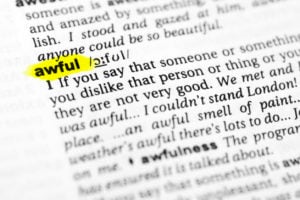
We’ve all felt it: the chagrin of discovering a typo in an important email, immediately after hitting “send”. It’s an awful feeling that we can easily spare ourselves if we proofread.
So why don’t we proofread better?
Because proofreading is slow work and we’re busy people—which was true even in the 17th century. Think of the poor guys responsible for the so-called “Wicked Bible“, which was printed in 1631.
Considering how irreparable printing mistakes were back then, you’d think that they would’ve been meticulous proofreaders. And yet, that version of the Bible contains a serious typo: someone forgot to add the word “not” to the seventh commandment. The result?
Thou shalt commit adultery.
Oops!
Unfortunately, there’s no real way to bypass the responsibility of proofreading. It’s an important part of the writing and publishing processes. But you can learn some effective strategies for how to proofread when you’re short on time. Use these six proofreading tips when you think you’re too busy to do it right:
1. Start with the assumption that you will find errors.
Don’t think of proofreading as a safeguard. Think of it as a necessary task that will help you catch the errors you almost certainly made. If you approach proofreading with a critical mindset, you’ll be able to work more efficiently and catch more errors the first time around.
2. Use a spell checker, but know its limits.
Spell checkers are like those friends who always point out the obvious. And sometimes, they can be life savers. Spell-checking software can’t do all the work for you, but it can give you a heads up about blatant errors. Do a quick scan of your piece to fix any obvious mistakes that the spell checker flags, but don’t stop there. Do a second read-through independently, to catch all of those idiosyncrasies of the English language that spell checkers just can’t pick up.
3. Read out loud.
Don’t just read what you think is on the page, read what is actually there. Why is this a time-saving strategy? Because it’s nearly foolproof when done correctly. Read each and every word out loud, and you will find mistakes on the first read-through that you might not have picked up otherwise. This works even better if you can read out loud to a friend. We’re much more likely to see the errors in our writing when we’re trying to communicate something to the person in front of us.
4. Read backward.
Start from the end and read back to the beginning. Examining your work from a new perspective will help you break free from the expectations you have about your own writing. This is an especially helpful technique if you’ve already revised each sentence so many times that you almost know them by heart. Proofreading backward is a quicker process than you might think.
5. Go slow to go fast.
Proofread with the understanding that you’ll have to read your own work carefully and slowly, and that there aren’t any real shortcuts. Go as slowly as you can. You’ll do a better job in the short time that you have and you’ll actually become much quicker each time.
6. Accept the fact that someone will have to do it.
Someone is going to have to proofread your work: it’s going to be you, your client, a friend, or someone you pay to do it for you. In the end, someone has to undertake the necessary work of proofreading. When you approach it as an unavoidable part of the writing process, you’ll be able to do it more efficiently.
Have Someone Else Proofread
If you’re a good writer who’s not good at proofreading, take heart: you’re in very good company. Some of the greats, like Faulkner and Fitzgerald, were said to have been notoriously poor spellers whose manuscripts were filled with errors.
Unless you have an editor who’s willing to do the dirty work for you, the responsibility of proofreading falls squarely on your shoulders. Yes, proofreading is painstaking and often tedious. But the good news is that it’s a skill that becomes easier with practice and patience.



